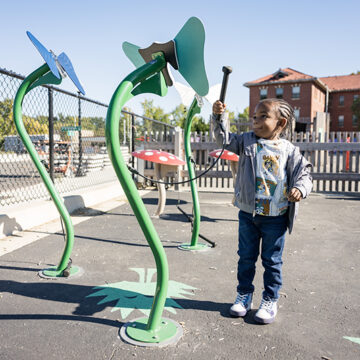Playgrounds are vital civic infrastructure, and just like any piece of infrastructure, they rely on materials, like steel, for their construction. When prices on those materials go up, costs for their overall construction follow, and that may ultimately drive demand down, which can have long-term impacts on the playground manufacturers and their customers.
This couldn’t come at a worse time. Many municipal and school systems are already facing significant fiscal headwinds. The combination of the COVID-era stimulus ending and the federal government’s pullback on other investments to help communities build sustainable child-centered outdoor infrastructure are fostering an uncertain fiscal environment that many park and recreation directors were already struggling to contend with. There are also significant talent pipeline challenges, with many municipalities finding it difficult to fill their seasonal hiring needs to support programming designed for communities.
That’s why there is an urgent need to manage costs. Our communities need more stability and predictability, whereas a trade war–even if short-lived–will only foster a sense of chaos and confusion. Even if the immediate effects of a trade war are short-lived, as many of the targeted countries make new bilateral trade agreements with the United States, the state of American kids’ play is still in jeopardy. Building or repairing playgrounds can only be done during a short window of time, so orders for those manufactured items would normally happen right now. Many of those orders are being paused as park and recreation directors hope for better market conditions to return. However, even short delays in the placement of those orders can stall projects, prevent kids from using their playgrounds this summer, and cause further market disruptions as manufacturers fail to hit their own production and revenue goals.
All of these outcomes are avoidable, and we hope that the pause on these tariffs are extended and expanded along with a broader policy reset. People can’t afford to pay higher costs, so raising fees or taxes to assist municipalities and school districts to deal with a more uncertain fiscal environment isn’t an option. That’s why we need policies that can both protect Americans’ economic security and keep inflation moving in the right direction.
As policymakers navigate these complex and challenging decisions, we want them to remember the parents, caregivers, and kids who are directly impacted by those choices. Promoting our nation’s long-term economic security and keeping costs down for local leaders struggling to maintain safe, engaging, and welcoming playgrounds available to families are not mutually exclusive goals. Playground use around the country has increased since the pandemic, and the benefits which have stemmed from that are being enjoyed across every segment of our society. We should avoid doing anything to jeopardize this positive trend in our nation’s public health outlook.
